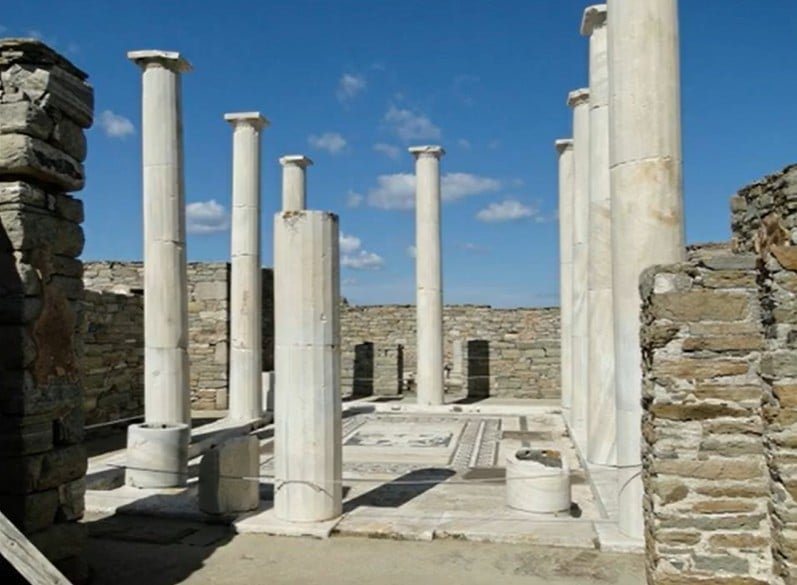
The sacred island of Delos, renowned as the mythological birthplace of Apollo and Artemis, holds a wealth of archaeological treasures. Yet, one private residence stands out from the ruins of temples and sanctuaries, offering a vivid portrait of the island’s peak commercial prosperity: the luxurious House of Dionysus.
Dating to the 2nd century BC, this residence is far more than just ancient walls. It is a stunning artifact that reveals the opulent lifestyle of the wealthy merchants and shipowners who flocked to Delos during its zenith as a major Hellenistic free port.
The masterpiece on Delos: Dionysus riding the tiger
The house draws its name and fame from the spectacular centerpiece of its floor—one of the most exquisite mosaics to survive the ancient world.
The artwork depicts the god Dionysus, the deity of wine, celebration, and ecstasy, as a winged figure (often interpreted as a divine daimon or spirit) riding a striped tiger or panther. The scene is rich with symbolism: Dionysus wears an ivy wreath and carries a thyrsus, while the great feline is adorned with a necklace of vines and grapes.

What elevates this mosaic to a masterpiece is its technical brilliance. It employs the advanced opus vermiculatum technique, using thousands of tiny, precisely cut tesserae—some as small as a single millimeter square—made from glass, stone, and terracotta. This allowed the artist to achieve remarkable shading, detail, and a vibrant, three-dimensional realism that rivals ancient painting.
To protect this fragile treasure, the original mosaic has been carefully moved to the Archaeological Museum of Delos, though visitors can still appreciate the scene through a replica on the site.
A glimpse into Hellenistic luxury
The House of Dionysus is a classic example of a Hellenistic peristyle house, meaning its rooms were organized around a central, columned courtyard. The structure’s large, towering marble columns still dominate the ruins, hinting at the impressive scale and grandeur of the original structure.
Located in the Theatre Quarter—the neighborhood of the island’s elite, situated near other notable homes like the House of the Dolphins—the House of Dionysus showcases the wealth and cosmopolitan tastes that defined Delos.
It serves as a powerful reminder that while Delos was a sacred religious center, it was equally a dynamic hub of trade, art, and high society in the ancient Mediterranean.
Related: Glimpses of History: Rare Photographs From Delos Island’s First Excavations


